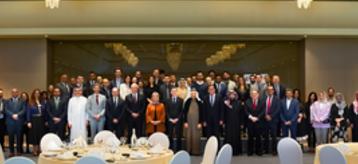Islamic finance issues probed

MANAMA: More than 1,000 industry leaders from the Middle East, Africa, Asia, Europe and America attended the 25th WIBC making it a definitive check point for the global Islamic finance and banking industry.
Convened by Middle East Global Advisors in strategic partnership with the Central Bank of Bahrain (CBB), the forum spurred a series of discussions focusing on Islamic finance and sustainable economic growth in the age of disruption.
The conference also recognised excellence within the Islamic finance and banking industry at a high-profile gala dinner whereby five WIBC Performance Awards were given away by Khalid Hamad, CBB executive director of banking supervision, to the top performing Islamic financial institutions based on their performance in the WIBC Leaderboard – a groundbreaking performance assessment tool aimed at enabling Islamic financial institutions to benchmark their performance against their peers.
Kuwait Finance House bagged the Global and GCC region awards, testament to its strong performance in the financial metrics of the WIBC Leaderboard.
Abdulhakeem Al Khayyat, managing director and chief executive of KFH-Bahrain, said: “On behalf of Kuwait Finance House group, we are honoured to have won these two prestigious awards.”
Other winners were: Jordan Islamic Bank being named the Best Performing Islamic Bank in Levant; Bahrain Islamic Bank being awarded for Governance and CSR; and Warba Bank honoured as the fastest growing bank by asset growth.
The final day of the conference played host to the launch of the Global Islamic Finance Development Outlook 2018: Building Momentum by Refinitiv.
The Islamic Finance Development Report presents the key statistics and trends across five indicators that are deemed to be significant for the development of the $2.4 trillion Islamic finance industry which are: Quantitative Development, Knowledge, Governance, Corporate Social Responsibility and Awareness.
Other key highlights from the final day include the panel discussions focusing on global economic outlook and impact on regional economy, cross-jurisdictional Issues in Sharia standards and practices and a country round-table focusing on Russia where leading industry experts analysed the challenges at hand with the ultimate aim of developing a convergence roadmap for the Islamic finance industry at large.
The conference also played host to an exclusive interview of Economic Development Board chief executive Khalid Al Rumaihi, which focused on emerging projects and financing, value-added tax to be implemented in the kingdom and the benefits and risks of digitisation.
Mr Al Rumaihi discussed the government’s integral role in supporting the continuous development of the local economy; encouraging constant collaboration between the public and private sectors, as well as creating an ecosystem that is conducive to the success of start-ups and entrepreneurs, in order to ensure the kingdom maintains its lead at the forefront of its competitors in digital transformation across industries.
Mr Al Rumaihi also mentioned the key milestones achieved by the GCC countries during the past three decades, and how they have employed the bilateral co-operation as a factor to promote brotherly countries and unite efforts to succeed in the initiatives and plans set in this regard.
During a panel session on economic growth and sustainable finance, Al Baraka Banking Group president and chief executive Adnan Yousif said: “The Islamic financial services industry has shown tremendous progress as one of the fastest growing asset classes in the world. The industry continues to expand in many emerging and advanced markets and introduce new standards that should further help develop products and attract investors. In order for Islamic banks to expand their geographical footprint further, they must be able to compete more effectively and tackle a number of key challenges facing the industry, including delivering cost efficiencies, building greater talent pools, enhancing corporate governance; leveraging digitisation, delivering innovative products that meet genuine market needs; and ensuring risk management systems are up to par.”
Source: http://www.gdnonline.com/Details/443487


